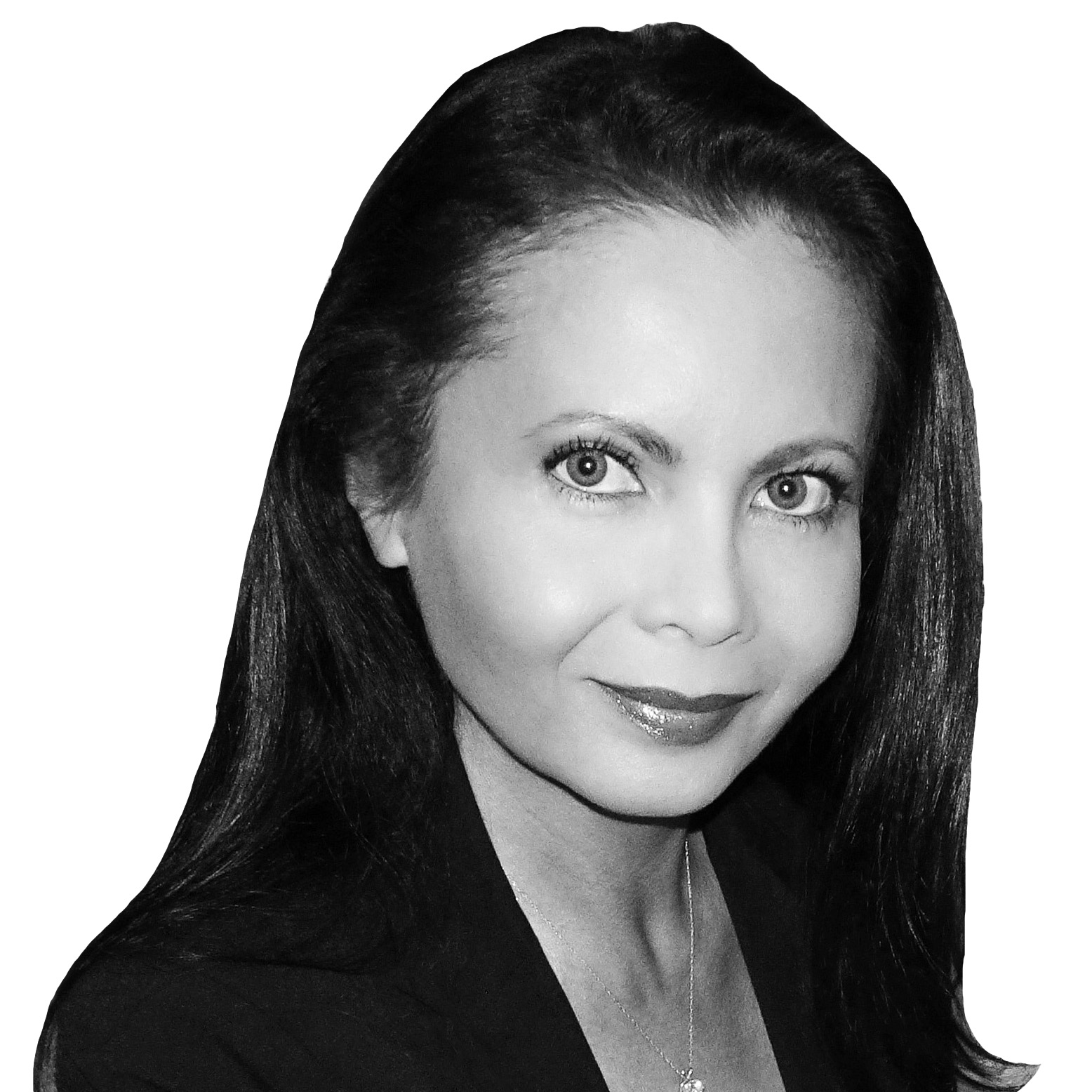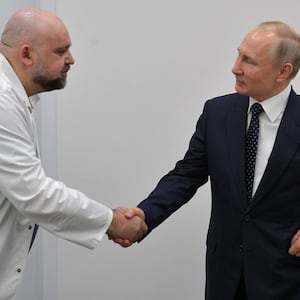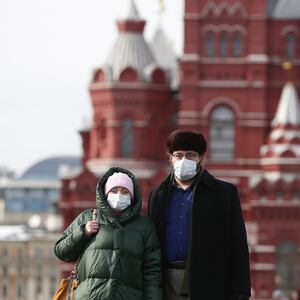The Kremlin’s highly publicized “humanitarian aid” to the plague-stricken United States is not an altruistic gesture. It’s a coldly calculated political move. But that doesn’t seem to worry President Donald Trump, who proclaimed during his press conference Thursday: “I’m not concerned about Russian propaganda. Not even a little bit.”
That’s a very big mistake. Yes, yet another one. This is an example of the Kremlin’s time-honored tactic diverting attention to another country as an example of things going even worse elsewhere, and Russian state media make it clear it’s anything but a goodwill gesture.
As the official story goes, Russian President Vladimir Putin asked Trump whether the United States needed Russia’s help in dealing with the coronavirus. As a publicity stunt, this could hardly be more obvious. But, likely to Putin’s surprise, the president of the mightiest country in the world said “Yes.” According to Russia’s state news outlet TASS, Trump accepted the favor “with gratitude” and is expected to reciprocate as needed in the future.
ADVERTISEMENT
According to Kremlin spokesman, Dmitry Peskov, the conversation between Trump and Putin pertained to the lack of Personal Protective Equipment, commonly referred to as “PPE,” in the United States. (Trump’s request is especially puzzling in light of his public statements claiming that there is no shortage of PPE in the U.S.)
State media outlet RIA Novosti reported that Putin dispatched a planeload of “disinfectants, glasses, respirators, masks and equipment.” Kremlin-funded RT (formerly Russia Today) described it as “a gift from the Kremlin to its coronavirus-stricken rival.”
Not quite. The U.S. Department of State said that this “gift” was actually a purchase of “needed medical supplies, including ventilators and personal protection equipment, from Russia.” Maria Zakharova, representative of the Ministry of Foreign Affairs of the Russian Federation, specified that the Russian Direct Investment Fund (RDIF) paid for half of the shipment.
The semi-generous gesture is indeed somewhat of an investment, providing a possible excuse to Trump if he moves to lift U.S. sanctions against Russia, imposed for its unlawful annexation of Crimea, covert military activities in Ukraine, attempted poisoning of Sergei Skripal, the downing of the Malaysian aircraft MH-17, and U.S. election interference.
The ventilators provided by Russia, as it happens, were manufactured by a subsidiary of a company that is currently under U.S. sanctions. Concern Radio-Electronic Technologies is a holding company within the Russian state-owned Rostec group.
The Kremlin denies that Putin has ever asked Trump to lift the sanctions, while the U.S. president claimed that the Russian president “has been asking that for two years,” and Russian state media pundits complain that Trump didn’t get the message when Putin called for the immediate removal of all sanctions at the recent G-20 summit. The lifting of the western sanctions remains one of the Kremlin’s top priorities.
During his press conference on Thursday, Trump claimed that Russia offered to send the supplies to America because it had a surplus. On the contrary, Russia itself is in dire need of tests, disinfectants, PPE and medical equipment, and the consequences are surfacing even on state television.
“They say, sew your own masks. There are no antiseptics… The doctors have no masks,” complained Russian lawmaker Alexei Zhuravlyov, appearing on Russia’s 60 Minutes. Olga Skabeeva, the host of 60 minutes, agreed: “There are no masks. That is completely true. Not a single pharmacy in Moscow has any masks… They don’t have the masks in our hospitals,” she said. “We’re all sewing them,” said Russian state TV host Vladimir Soloviev during his own program, The Evening with Vladimir Soloviev.
In March, convicts in three Russian prisons produced 132,000 masks. In April, prisoners in 120 of Russia’s penal colonies are set to begin mass-producing them. It’s unclear whether the masks produced in Russian prisons were sold by Putin to the United States under the guise of “humanitarian aid” requested by Trump.
“Overnight, the United States became the anti-leader—in the number of infections and deaths from the coronavirus,” proclaimed Igor Kozhevin, the host of Russian state TV news show Vesti on channel Rossiya-1, naming the U.S. as an example not to be followed.
What the Russians want their people to believe is that they have a handle on the pandemic, and they’re going to emerge as the great victors when the COVID-19 crisis eventually subsides.
Thus they portray America’s failure to contain the disease as the collapse of the entire democratic system of government. Discussing Russia’s aid to the United States, the Russian newspaper Vzglyad wrote: “America is no longer a hegemon, but is still trying to act as such… If the death rate from coronavirus in the United States goes to many tens, or even hundreds of thousands, and the economic disruption continues, against the backdrop of the elections, this could lead to serious internal upheavals in the already divided American society.”
Vzglyad concluded: “In any case, China emerges victorious—not because it defeated the virus first, but because it will continue its expansion into all parts of the world… The U.S.-Chinese battle is only part of a common geopolitical war… In this complex conflict, Russia appears not just as the owner of a ‘golden share,’ as the Americans think, but as the main engine of the whole process of creating a new world order. Russia and China are essentially allies; we have a very close vision of the post-American world.”
Appearing on The Evening with Vladimir Soloviev, political scientist Sergey Mikheyev opined about the United States: “They’re hiding, trying to solve their own problems. Russia and China are helping them… Everyone noticed it. Even the most pro-Western people noticed it… This will degrade the value of democracy in the entire world.”
In point of fact, Russia is not doing well at all. After months of denial, the Kremlin is suddenly forced to admit the unfolding reality of the coronavirus pandemic. Official statistics this Friday reported 4,149 cases of infection and 34 deaths, with 215,000 “under observation” for potential exposure to the virus.
Russian President Vladimir Putin shook hands with a coronavirus-infected doctor, minutes before encasing himself in a yellow hazmat suit. The stunt of visiting a hospital that treats the coronavirus patients, meant to reassure the general population, turned out to be a much riskier photo-op than bare-chested horse riding.
Adding to the Kremlin’s worries, two of its officials reportedly have tested positive for the coronavirus. Additionally, Vladimir Putin’s spokesman Dmitry Peskov attended the same party as singer Lev Leschenko, who was later diagnosed with the coronavirus. Multiple Russian government officials, including Vladimir Putin, are reportedly being tested for the coronavirus on a daily basis.
Viktor Maleev, the head of the Central Research Institute of Epidemiology of the Russian government agency Rospotrebnadzor, called the coronavirus test “a psychotherapeutic measure,” meant to comfort worried citizens. It seems that these days, Kremlin officials are in need of much comforting.
Russian state television program Vesti on channel Rossiya-1 assured anxious audiences: “Situation with the spread of the coronavirus in our country is under control… Unlike a number of other countries, there is no explosive growth of the number of infected people in Russia.”
The Kremlin is known for its creative approach to facts, skewing heavily in favor of saving face rather than saving the population.
Surreal scenes are unfolding in Moscow, where barren streets are being heavily patrolled and the stern voice over the loudspeakers urges citizens to stay at home. Policemen stop passing vehicles and those traveling on foot, asking for their justification to venture outside of their home or work. All patients diagnosed with the coronavirus are entered into a specially-created database that includes their photographs.
Appearing on the nightly television show The Evening with Vladimir Soloviev, former Chairman of the National Society of Industrial Medicine Alexey Yakovlev argued that eventually—unless the citizens comply with the terms dictated by the government—the time will come “to close the subways, bring out the army and chase them down with nightsticks.”
“Hard times lie ahead of us,” warned Moscow Mayor Sergei Sobyanin.
Tensions run high on Russia’s state TV, with out-of-control pundits yelling and finger-pointing about the best measures for dealing with the spread of the coronavirus. Appearing on state TV show 60 Minutes, lawmakers Leonid Kalashnikov and Alexei Zhuravlyov accused each other of lying to the people, “licking President [Putin’s] behind” and drinking before the show. The host, Evgeny Popov, nervously attempted to calm them down, but the horrid story that the show covered next did little to diffuse the tensions.
In a local hospital of Syktyvkar, the capital of Russia's Komi republic, located 620 miles northeast of Moscow, 55 people had been accidentally infected by a doctor. Multiple patients who tested negative for the coronavirus are being confined in the Ezhvinsky district hospital against their will. Terrified of being infected by the medical staff that is freely coming and going from the facility, these hostages of the medical system recorded a video pleading for their release—to no avail. A total of 261 people, including 24 members of the medical staff, remain in isolation at the hospital. After the government announced the commencement of an investigation into this matter, Governor of Komi Sergey Gaplikov promptly resigned.
“Timeo Danaos et dona ferentes," warns a Latin phrase from Virgil’s Aeneid, referring to the hollow horse that defeated Troy’s defenses. It has been paraphrased in English as the proverb "Beware of Greeks bearing gifts." The same could be said about accepting aid from the Kremlin.








